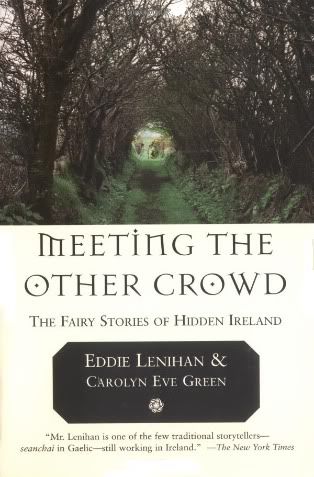Book-It '10! Book #35
The Fifty Books Challenge, year two! This was a library request.

Title: Meeting the Other Crowd: The Fairy Stories of Hidden Ireland by Eddie Lenihan and Carolyn Eve Green
Details: Copyright 2004, Tarcher
Synopsis (By Way of Booklist Description): "'The Other Crowd,' 'The Good People,' 'The Wee Folk,' and 'Them' are a few of the names given to the fairies by the people of Ireland. Honored for their gifts and feared for their wrath, the fairies remind us to respect the world we live in and the forces we cannot see. In these tales of fairy forts, fairy trees, ancient histories, and modern true-life encounters with The Other Crowd, Eddie Lenihan opens our eyes to this invisible world with the passion and bluntness of a seanchai, a true Irish storyteller."
Why I Wanted to Read It: This was suggested to me by Amazon (they consider Witches = faeries and it looked fairly interesting.
How I Liked It: The book has a fascinating premise. The idea of stories told and collected about the Fae in a stripped-down fashion, devoid of the glitter or Tinkerbell that now clings to the mythology is a wonderful idea.
However it fails in execution. The stories are of the sort that are much better heard than read, particularly when the author(s) writing them up clutters the prose with "accents" that sound false and are almost impossible to read. While a section in plain English is offered after each account, analyzing it and considering various similarities, it seems to only highlight the way the stories themselves are almost incomprehensible.
A pity, since you can almost see the fascinating stories within the ersatz-sounding "olde country Irish" dialect.
Notable: The authors list the date of each "interview" with the subject (individual providing the story) and while I realize this is beside the point, I couldn't help but notice how many took place the week after the September 11th attacks. While telling a story of the past, you're obviously not going to be focused on the present, even in such a shock as 9/11 was, and I'm sure any preamble comment on the world situation would be edited out. Still, I read these entries expecting to find something akin to "It was madness then, all of a sudden. Sort of like it is now all over," or "People were wary then, like they are now," or "I feel ashamed to discuss something of such good spirits in a time like this". While the "Irish" dialect was hard to sift through, I couldn't make any out. I realize it makes perfect sense for these storytellers not to have mentioned it, but just the same it feels odd, albeit from the view of nearly nine years after the fact.

Title: Meeting the Other Crowd: The Fairy Stories of Hidden Ireland by Eddie Lenihan and Carolyn Eve Green
Details: Copyright 2004, Tarcher
Synopsis (By Way of Booklist Description): "'The Other Crowd,' 'The Good People,' 'The Wee Folk,' and 'Them' are a few of the names given to the fairies by the people of Ireland. Honored for their gifts and feared for their wrath, the fairies remind us to respect the world we live in and the forces we cannot see. In these tales of fairy forts, fairy trees, ancient histories, and modern true-life encounters with The Other Crowd, Eddie Lenihan opens our eyes to this invisible world with the passion and bluntness of a seanchai, a true Irish storyteller."
Why I Wanted to Read It: This was suggested to me by Amazon (they consider Witches = faeries and it looked fairly interesting.
How I Liked It: The book has a fascinating premise. The idea of stories told and collected about the Fae in a stripped-down fashion, devoid of the glitter or Tinkerbell that now clings to the mythology is a wonderful idea.
However it fails in execution. The stories are of the sort that are much better heard than read, particularly when the author(s) writing them up clutters the prose with "accents" that sound false and are almost impossible to read. While a section in plain English is offered after each account, analyzing it and considering various similarities, it seems to only highlight the way the stories themselves are almost incomprehensible.
A pity, since you can almost see the fascinating stories within the ersatz-sounding "olde country Irish" dialect.
Notable: The authors list the date of each "interview" with the subject (individual providing the story) and while I realize this is beside the point, I couldn't help but notice how many took place the week after the September 11th attacks. While telling a story of the past, you're obviously not going to be focused on the present, even in such a shock as 9/11 was, and I'm sure any preamble comment on the world situation would be edited out. Still, I read these entries expecting to find something akin to "It was madness then, all of a sudden. Sort of like it is now all over," or "People were wary then, like they are now," or "I feel ashamed to discuss something of such good spirits in a time like this". While the "Irish" dialect was hard to sift through, I couldn't make any out. I realize it makes perfect sense for these storytellers not to have mentioned it, but just the same it feels odd, albeit from the view of nearly nine years after the fact.